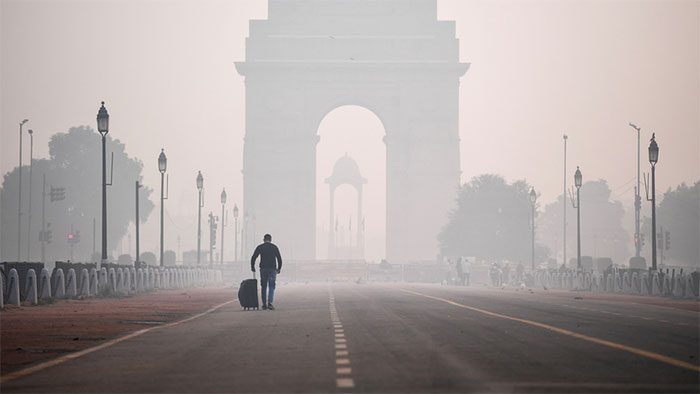Scientists Discover Mechanism Linking Air Pollution to Lung Cancer in Non-Smokers. This study is considered a breakthrough for science and society.
According to AFP, the research has not yet been published in a scientific journal but was presented by a team of experts from the Francis Crick Institute (UK) at the annual conference of the African Medical Oncology Society held in Paris on September 10.
The study illustrated the health risks posed by fine particles generated from the burning of fossil fuels, raising urgent calls for action against climate change.
Charles Swanton from the Francis Crick Institute stated that this research could pave the way for a new field in cancer prevention.
Decoding the Mysterious Phenomenon
Air pollution has long been linked to a higher risk of lung cancer in individuals who have never smoked. Typically, exposure to carcinogens such as those found in cigarette smoke or pollution is thought to cause DNA mutations, leading to cancer in many people.
However, there remains a gray area in this hypothesis. According to Swanton, previous studies have shown that DNA mutations can exist without leading to cancer. Notably, most environmental carcinogens do not cause gene mutations.

A man walking in polluted air in New Delhi, India. (Photo: Reuters).
Therefore, his research proposes an alternative explanatory model. The team of experts from the Francis Crick Institute and University College London analyzed health data from over 460,000 individuals in the UK, South Korea, and Taiwan.
They found that exposure to ultra-fine PM2.5 particles—measuring less than 2.5 microns—led to a higher risk of EGFR gene mutations.
In laboratory studies on mice, the authors discovered that these particles caused changes in the EGFR gene as well as in the KRAS gene, both of which are associated with lung cancer.
Finally, they analyzed nearly 250 lung tissue samples from individuals who had never been exposed to carcinogens from smoking or heavy pollution. Their lungs were healthy but exhibited DNA mutations in 18% of the EGFR gene and 33% of the KRAS gene.
“They just ‘sit’ there and perhaps are not enough to develop into cancer,” Swanton remarked, noting that these mutations appear to increase with age.
He added that when a cell is exposed to pollution, it may trigger a “wound healing response” that causes inflammation. If that cell “harbors a mutation, it will form cancer.”
According to the expert, this has helped them uncover the biological mechanism behind what was previously a mystery.
In another experiment on mice, they discovered an antibody that can block the inflammatory mediator interleukin 1 beta, preventing cancer from developing from the outset.
Swanton hopes this discovery will provide a foundation for a new molecular-level approach to cancer prevention, where patients could simply take a pill each day to reduce their cancer risk.
“A Revolution”
Suzette Delaloge, Director of the Cancer Prevention Program at the Gustave Roussy Institute in France, described this research as “revolutionary, as we have no evidence of how cancer forms that replaces previous hypotheses.“
She told AFP: “This is quite an important step for science, and I hope for society as well.”
Delaloge did not participate in the research but discussed it at the conference on September 10. She noted that this opens a significant door for both knowledge and new methods to prevent cancer development, while also compelling authorities to act on an international scale.

The new research found that exposure to ultra-fine PM2.5 particles—measuring less than 2.5 microns—
Cancer researcher Tony Mok from the Chinese University of Hong Kong called this study “exciting.” He stated: “We might question whether in the future we can use lung CT scans to look for pre-cancerous lesions in this organ and attempt to reverse them using drugs like interleukin 1 beta inhibitors.”
Meanwhile, Swanton referred to air pollution as “a silent killer.” The research estimates that it is linked to the deaths of over 8 million people each year—equivalent to tobacco.
Another study has linked PM2.5 to 250,000 annual deaths from lung cancer.
“You and I have the choice of whether to smoke or not, but we do not have the choice about the air we breathe. When considering that the number of people exposed to high levels of air pollution is five times greater than those who smoke, you see this is a pressing global issue,” Swanton added.
The expert emphasized that we can only address this if we recognize the close connection between climate health and human health.
Lung cancer is a common disease worldwide and has become the leading cause of death among cancers in recent times. An estimated 1.8 million deaths globally occur each year due to lung cancer.
According to Johns Hopkins Medicine, noticeable symptoms of lung cancer may not appear until the disease progresses to a severe stage. In some cases, the symptoms are very difficult to recognize or easily mistaken for many other health conditions such as fatigue, cough, chest pain, unexplained shortness of breath, weight loss, or loss of appetite. According to the American Cancer Society, if symptoms do not improve or worsen, such as coughing up blood, you should seek medical attention immediately.


















































